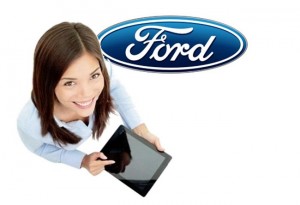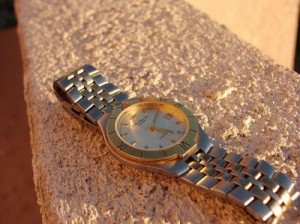The automaker will be attaching devices to feature models to broadcast information to customer smartphones.
Ford dealerships could soon have a new way of making sure that customers visiting showrooms will learn about the hottest features associated with certain models as the company pilots a geolocation technology based marketing program.
This would send key info about a model directly to a consumer’s smartphone as he or she approaches it.
The hope is that this geolocation technology will help to make it easier to close a sale. The consumer will receive information only about the models that have caught his or her attention, as the tech sends the information about the models that the potential buyer has approached, as he or she walks around the vehicle. I t is as though the vehicle will be able to give its own sales pitch, regardless of whether or not an associate is present at that specific moment.
t is as though the vehicle will be able to give its own sales pitch, regardless of whether or not an associate is present at that specific moment.
The geolocation technology will allow customers to enjoy a more independent sales process.
Many consumers do the majority of their research online, using an automaker’s website to be able to learn about the features, options, and pricing of a vehicle. Actually visiting a showroom floor is essentially at the very end of the purchasing cycle, when the consumer is quite close to making a final decision.
This indicates that consumers are more interested in finding out a large portion of the information about various vehicle models on their own, and that an actual sales associate at a dealership has a notably smaller window of time in which to close a sale.
The Ford.com digital manager, global and mobile, Trisha Habucke, pointed out that “Even five or six years ago, people would actually go to the dealer four or five times (before making a purchase). Now they’re doing so much research independently that when they get to the dealership they don’t want to start over, they want to continue on and get their pricing and get their ‛why buys’ right there. And sometimes they want to do that independently,” ahead of actually speaking with one of the dealerships sales team.
The geolocation technology marketing is meant to help consumers to do that, so that they can still inform themselves in the way and timing that they prefer.
This is because the product has been designed to retrofit existing pieces into wearable technology.
According to Chronos Wearables, its hardware can be used in order to create a smartwatch by retrofitting existing wristwatches, as the company claims that “the best wearable is the one you already wear.”
This device would allow both digital and traditional mechanical watches to be converted into wearable technology.
The hardware was developed by an American startup. Earlier in June, it drew a lot of attention when it demoed a technique that is called “microsuction” in order to adhere a slim disk to the back of a traditional wristwatch in order to convert it into a smartwatch. That demonstration was made at the Highway 1 accelerator’s demo day. This allows the device – and, therefore, the wristwatch attached to it – to sync with the wearer’s smartphone so that notifications can be delivered to the wearer by way of lights that appear at the edge of the wristwatch, as well as vibrations that the wearer can feel.
The conversion provides a few of the features of a smartwatch that are often seen in smart jewelry offerings.
 According to Chronos Wearables founder, Mark Nichol, “It’s a super thin disk that uses microsuction to attach to the back of your watch,” adding that “It delivers notifications from your phone, as well as tracking your health.” This indicates that it does have additional features that go above and beyond the current type of pendant wearable technology and is somewhat of an experience that is halfway between that and the latest smatwatches.
According to Chronos Wearables founder, Mark Nichol, “It’s a super thin disk that uses microsuction to attach to the back of your watch,” adding that “It delivers notifications from your phone, as well as tracking your health.” This indicates that it does have additional features that go above and beyond the current type of pendant wearable technology and is somewhat of an experience that is halfway between that and the latest smatwatches.
Nichol explained that the demonstration at Highway 1 “was our soft launch. We’ll be doing a pre-sale later this summer where we’ll be announcing exciting partnerships with some hot watch brands.” He said that 80 percent of the wristwatches that are currently on the market are compatible with the Chronos Wearables device. That said, the company is also hoping to be able to build its tech right onto wristwatch backs once it establishes some partnerships with watchmakers.
Until now, the interest in the smartwatch from consumers has been limited, even when the Apple Watch – the device that was supposed to propel this wearable technology category forward – was taken into consideration.
 t is as though the vehicle will be able to give its own sales pitch, regardless of whether or not an associate is present at that specific moment.
t is as though the vehicle will be able to give its own sales pitch, regardless of whether or not an associate is present at that specific moment.
 According to Chronos Wearables founder, Mark Nichol, “It’s a super thin disk that uses microsuction to attach to the back of your watch,” adding that “It delivers notifications from your phone, as well as tracking your health.” This indicates that it does have additional features that go above and beyond the current type of pendant
According to Chronos Wearables founder, Mark Nichol, “It’s a super thin disk that uses microsuction to attach to the back of your watch,” adding that “It delivers notifications from your phone, as well as tracking your health.” This indicates that it does have additional features that go above and beyond the current type of pendant 